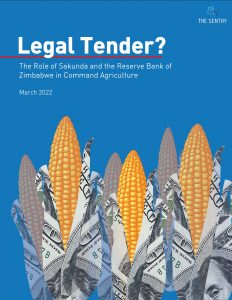 Read the full report and recommendations
Read the full report and recommendations
> Read the summary in English, Shona, or Ndebele.
Possibly unlawful payments from Zimbabwe’s central bank to presidential advisor Kudakwashe Tagwirei’s companies formed up to one-third of the $280 million his firms received while running the Command Agriculture program, according to new analysis by The Sentry.
From 2016 to 2019, Tagwirei’s firm Sakunda Holdings ran Zimbabwe’s Command Agriculture program, which was intended to boost agricultural production through the provision of inputs such as seed and fertilizer to commercial farmers. Sakunda—an oil trading company—was appointed to run the billion-dollar project without an open tendering process.
The Sentry’s investigation found that, over the course of the three-year program, Sakunda received $1.28 billion total—$230 million in hard currency and over $1 billion in Treasury Bills—while providing inputs worth $1 billion: an apparent surplus of $280 million.
One of the Treasury Bills was improperly redeemed at a favorable exchange rate by the Reserve Bank of Zimbabwe (RBZ) after a new law had reduced the US dollar value of such assets. While others saw the US dollar value of their Treasury Bills fall, the RBZ protected Tagwirei’s asset from this reduction in value when it was cashed in: the central bank sent more Zimbabwean dollars to his firms than it was obliged to by the new law. This decision was worth—in US dollars—at least $50 million, and perhaps up to $100 million, for the oil tycoon’s companies. The International Monetary Fund reportedly blamed the Reserve Bank’s treatment of this Treasury Bill for bloating the money supply and contributing to inflation and the rapid decline in the value of Zimbabwe’s new currency from mid-2019.*
Sakunda, which denies any wrong-doing, testified in Zimbabwe’s Parliament that it received the favorable rate so that it could repay foreign suppliers—particularly of chemicals—in hard currency.* However, it appears that the Treasury Bill was given a preferential exchange rate partly to allow one of Tagwirei’s firms to pay the government for some gold mines and a Zimbabwean military-controlled company for its share of a platinum mining joint venture with a Russian conglomerate. In effect, the publicly owned RBZ was printing money for private companies to buy publicly owned assets.
Command Agriculture was the product of a behind-closed-doors culture: the procurement process for this billion dollar program, the preferential treatment of the Treasury Bill, and the selection of recipients of inputs were all hidden from public view. The Sentry’s recommendations therefore include procurement transparency measures that could allow Zimbabwean citizens to see how their money is spent.
Read the full report >
So that Zimbabwean citizens can discuss procurement and public financial management issues, The Sentry is also publishing the following supporting materials* and links to source material:
- A spreadsheet tallying the cash and Treasury Bills issued to Sakunda Holdings from 2016 to 2019, linked to the source documents for each payment. Access the spreadsheet.
- A spreadsheet with links to Treasury Bill issuance notes accounting for $3.35 billion expenditure from 2015 to 2018, for a wide range of purposes, not just agricultural support. Access the spreadsheet.
- A spreadsheet summarizing public expenditure in 2017 and 2018 by the RBZ and from the Consolidated Revenue Fund. Access the spreadsheet.
- A 1,000 word summary of the full report’s findings in English, Shona, and Ndebele, with a small file size (less than 200 kb), designed to be shared via WhatsApp or Signal and read on a mobile phone. Access the summary in English > Ndebele > Shona
*These materials are hosted on Google Suites and DocumentCloud using the email address [email protected].
The findings of this report were also discussed in a webinar with Daily Maverick Foreign Affairs journalist Peter Fabricius, Zimbabwe opposition leader Tendai Biti, and The Sentry’s Senior Investigator Nick Donovan.

